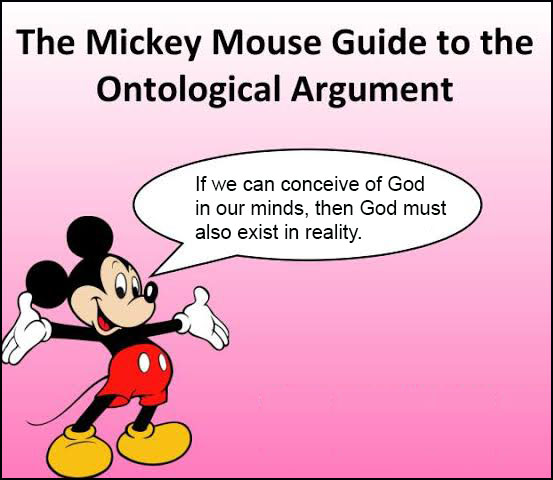983 The Ontological Proof

Letter to The Australian Rationalist Journal:
Discussion about the ontological argument (Contradictions and Paradoxes, by Jack Dikian) is for me what for petrol heads is the sound of a V8 engine. Indeed, ontological arguments have fascinated philosophers for almost a thousand years.
Without any proof for Her/His existence, it is most likely that there is no God ... i.e. a supernatural agent, actively interested in the affairs of human individuals. Nevertheless, the ontological argument posits (in its simplest form) that if we can conceive of God in our minds, then S/He must exist in reality.
To me - to the atheist - it is obvious that the argument breaks down in respect of the religious God up in Heaven who created the world, Earth and all its beings ... and, furthermore, then takes an interest in a select few believers.
The ontological proof put forward by Gödel requires not inconsiderable mind gymnastics, where he stated that, “God does exist in our understanding (our mind, mythologies, religions, my bracket, CB). If God exists in the understanding ... we can imagine Him to be existing in reality. Therefore, God must exist." Capricious mind gymnastics indeed.
Myself, I like to use the ontological proof for the existence of God in respect of an inner God … God as the seat in me of my spiritual core - call it soul, if you will - or, less specific, the seat of goodness, compassion and my sense for ethics.
The medieval German mystic Meister Eckart (1260 – 1328) said, “As I preach, I speak of detachment and I say that man should be empty of ego; he should be aware of the simple good that God is; he should consider the greatness God has set up in the soul, so that by those means man may realise God; as I speak of God, I speak of the purity of the divine nature.” (One should note that those utterances got Meister Eckhart into a lot of trouble with the Inquisition.)
The ontological argument fits nicely here, proving the existence of an inner God ... if one wants to subscribe to the idea.
There is another God that the ontological proof could be applied to. In the not too distant future our quantum computers will be nearly infinitely powerful. Then it will be possible to re-create our entire world in a simulation; we will be able to store that program on a relatively small device and dispatch it to a planet in another solar system in our galaxy, should our own solar system fail at some stage.
That computer + its program will then use the raw materials available there and re-create a world similar to ours on a distant planet; we cannot know if this has not happened in the past, maybe even here on Earth. The computer, its OS & the program will be equal to God. Since that God exists in our understanding, it is clear - ontologically speaking - It is real.
Following this could be a discussion about creationism; better not.
However, a fascinating read in this context is Frank Tippler's book The Physics Of Immortality, where he presents a purely scientific argument for the existence of God. Tipler is an American mathematical physicist and cosmologist in the field of global general relativity. When he devised a mathematical model of the end of the universe, Tipler - using sophisticated methods of modern physics - came to the conclusion that he had created the argument for the existence of God.
One could contend that the ontological argument here is taken to a scientific level, based on mathematics, cosmology and general relativity, rather than faith. (Warning, other than for mathematics professors, the book is fiendishly difficult; laypersons like myself may find themselves speed-reading pages and pages of maths & physics. The book also is oh-so controversial.)